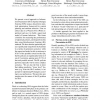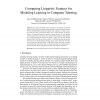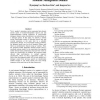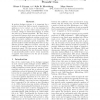20 search results - page 4 / 4 » Using dialogue acts to learn better repair strategies for sp... |
ACL
2001
13 years 6 months ago
2001
We address the issue of on-line detection of communication problems in spoken dialogue systems. The usefulness is investigated of the sequence of system question types and the wor...
ACL
2010
13 years 2 months ago
2010
We present a novel approach to Information Presentation (IP) in Spoken Dialogue Systems (SDS) using a data-driven statistical optimisation framework for content planning and attri...
AIED
2007
Springer
13 years 11 months ago
2007
Springer
We compare the relative utility of different automatically computable linguistic feature sets for modeling student learning in computer dialogue tutoring. We use the PARADISE frame...
AICOM
2008
13 years 5 months ago
2008
Since speaker's intentions can be represented into domain actions (pairs of domain-independent speech acts and domain-dependent concept sequences) in goal-oriented dialogues,...
ANLP
2000
13 years 6 months ago
2000
In spoken dialogue systems, it is important for a system to know how likely a speech recognition hypothesis is to be correct, so it can reprompt for fresh input, or, in cases wher...




